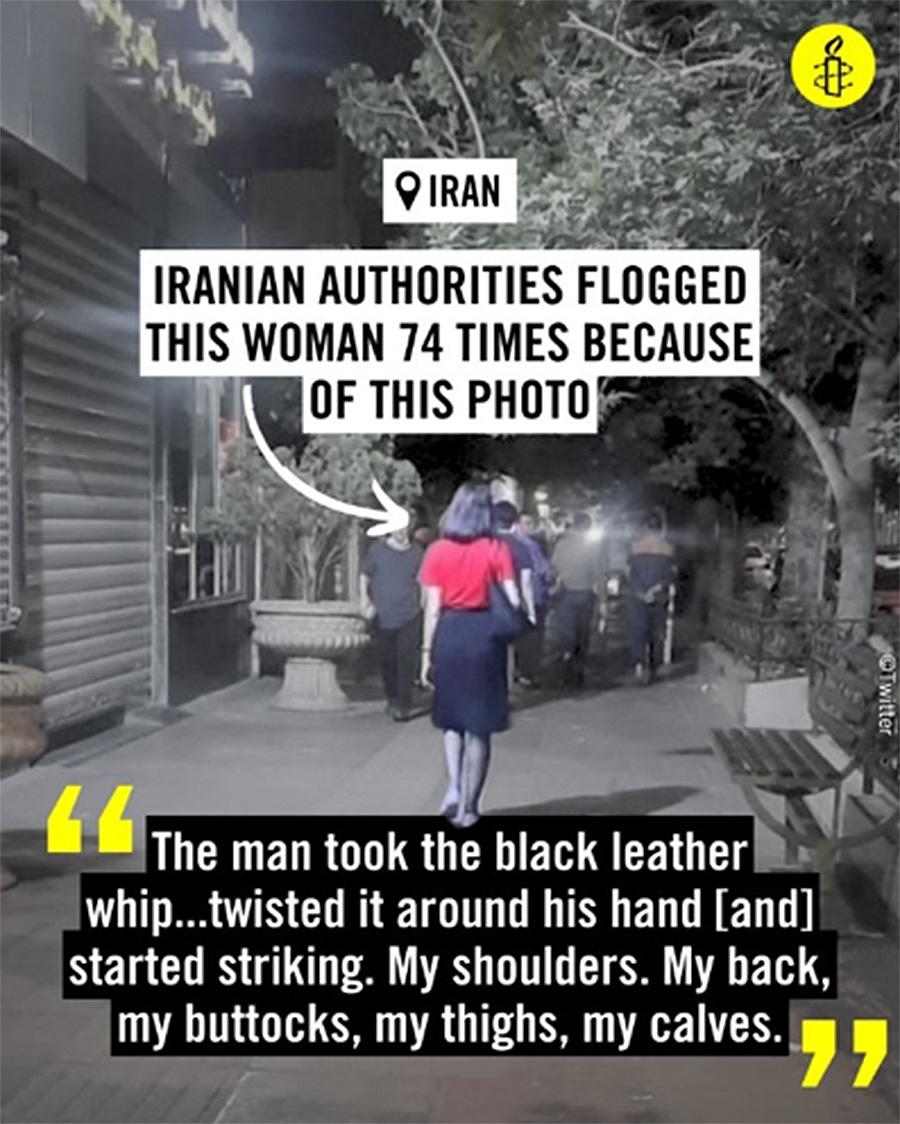Roya Heshmati, 33, was handcuffed to a bed with iron bands and lashed with a whip 74 times by Iran’s misogynistic Sharia law enforcers. She had posted a photo of herself on social media walking on a street in Tehran without a hijab (headscarf). Determined not to cry out during this sadistic torture, she whispered to herself, “In the name of woman, in the name of life, the clothes of slavery are torn, our black night will turn to dawn, all the whips will be smashed….” Dragged before a judge after the whipping, unrepentant, she told him, “We will continue our resistance.”1 Her cruel whipping unleashed widespread outrage in Iran and beyond.

Amnesty Iran social media post
For the regime, the compulsory hijab is a cornerstone and social glue to its theocratic rule and legitimacy that they won’t and can’t give up. For millions of women, it is a red line to struggle against oppression and for life and freedom. Many women in Iran continue to take risks in bravely resisting the forced hijab.
Narges Mohammadi Sentenced to 15 More Months in Prison
One of the frontline fighters who continue to resist the forced hijab and other injustices in Iran is Narges Mohammadi. Her family reported on Instagram that she has been given new charges of propaganda against the Islamic Republic as she continues to stand up and speak up from behind the walls of Evin Prison’s women’s ward.
Nine days after being awarded the Nobel Peace Prize in absentia, Narges was tried in a sham process that she refused to legitimize by attending. She was sentenced to an additional 15 months in prison and additional bans.
Her family states, “From the year March 2021 until now, this is Narges's fifth conviction, with three of them being due to her activities from inside prison. Her total five convictions amount to 12 years and 3 months of imprisonment, 154 lashes, 4 months of travel ban, 2 years of exile, and various social and political prohibitions.”
For a personal look at what drives Narges Mohammadi, watch the recent 30-minute documentary by dw.com, Unbreakable - My Fight for Freedom in Iran.
Women Journalists Released on Bail, Then Charged Again for Being Hijab-less
Women journalists Elahe Mohammadi and Niloufar Hamedi had been in prison since September 2022 for breaking the news and coverage of the death of Mahsa Jina Amini by the morality police for not covering her hair properly. For that, Mohammadi, 36, was given a 12-year sentence (6 years to be served) and Hamedi had received 13 years (7 to be served). Both had been banned from working for the media on outrageous charges of “collaboration with the hostile government of the United States,” “propaganda against the regime,” and “assembly and collusion to act against national security.”
On January 14, 2024, they were released pending their appeals after posting an exorbitant bail. They walked out of prison into the arms of a joyous crowd of family, friends and supporters. In one of the photos posted on social media, the two women pose with flowers, a keffiyeh, and no head covering.

L-R: Niloufar Hamedi, Elahe Mohammadi. Photo: social media
Two days later, fresh charges were announced against them for violating Iran’s Islamic compulsory hijab law.
Dissident Musicians Toomaj Salehi and Mehdi Yarrahi Sentenced
As we reported in December, the defiant rapper Toomaj Salehi was rearrested 12 days after being released on bail. He was in the process of appealing a six-year sentence due to his lyrics against the regime and supporting the Jina Uprising that began in fall 2022.2 He was quickly convicted on a new charge of “propaganda against the state” for publicizing the torture he was subjected to in prison. He was then sentenced to an additional year in prison, two years ban on travel outside Iran, and “behavior management classes.”
On January 9, the pop singer Mehdi Yarrahi was sentenced to two years in prison and 74 lashes (i.e. whipping) for his protest song “Roosarito” (“Your Head Scarf”), which he dedicates to “the noble women of my homeland, who bravely shine in the front line of the ‘Woman, Life, Freedom’ movement.” He was convicted of “producing, sending, distributing, and publishing obscene and immoral content through computer and telecommunication systems, encouraging people towards corruption and obscenity,” and “propaganda against the system” – for his uplifting and beautiful song in support of women’s rights and freedom. He is currently out on bail.
As aptly pointed out by former political prisoner Somayeh Kargar in a letter to current prisoner and 2023 Nobel Peace Prize winner, Narges Mohammadi:
“What was the uprising, and what does it have to do with the Islamic Republic and the global system? The Jina uprising is part of the global struggle of women against their conditions in this world.”3
Possessing the Joy of Rebellion Against Oppression
It is notable that millions in Iran remain unbroken and refuse to give in or give up against the most vile repression by the Islamic fundamentalist regime. This invitation calls for other artists, writers, authors to step forward:
Aren’t we all sick to death of the vacant or putrid culture that degrades women, worships bling-bling, money, self, xenophobia, theism and other slavish nonsense? Shouldn’t we fight for something liberating such as to free an artist who is the opposite of all that? And one who is courageously putting his life on the line for something bigger than himself?!
and
This should inspire and challenge us all to have their back and follow their example to fight for a better world. This is a critical moment for such bravery in today’s world and as Iran’s reactionary regime is ramping up executions, targeting many political prisoners.